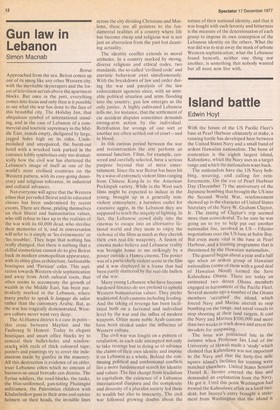Gun law in Lebanon
Simon Macnab
Beirut
Approached from the sea, Beirut comes up out of its smog like any other Western city, with the inevitable skyscrapers and the forest of television aerials above the apartment blocks. But once in the port, everything comes into focus and only then is it possible. to see what the war has done to the face of this beautiful city. The Holiday Inn, that ubiquitous symbol of international standing, and in the case of Lebanon of a commercial and touristic supremacy in the Middle East, stands empty, disfigured by large, jagged holes high on its sides. unde.molishecl and unrepaired, the burnt-out hotel with a wrecked tank parked in the entrance lobbY symbolises only too dramatically how the civil war has shattered the Lebanon's image of itself as one of the world's most civilised countries on the Western pattern, with its easy-going democracy and religious tolerance, its industrial and cultural advances.
Not everyone will agree that the Western ethos that pervaded Beirut and its educated classes has been undermined by recent events. There are those, priding themselves on their liberal and humanitarian values, who still refuse to face up to the realities of the war with its 60,000 dead, who sterilise their memories of it, and in conversation will refer to it simply as 'les evenements' or les troubles". They hope that nothing has really changed, that there is nothing that a skilful cosmetician cannot do to give Beirut back its modern cosmopolitan appearance, with its shiny glass architecture, fashionable boutiques and 'Parisian' cafes. This aspiration towards Western-style sophistication and away from Arab cultural roots, that often seems to accompany the growth of wealth in the Middle East, has been particularly marked in the Lebanon, where many prefer to speak le Ian gage du salon rather than the customary Arabic. But, as the war has tragically demonstrated, Western culture never went very deep..
The Al-Hamra district is a case in point — this cross between Mayfair and the Faubourg St Honore. Today its elegant boutiques and smart office blocks try to conceal their bullet-holes and windowcrack l with reels of thick coloured tape; posters and paintings try to cover the indentations made by gunfire in the masonry. All this destruction is evidence of an older, .truer .Lebanese ethos which no amount of business-as-usual bravado can dismiss. The Syrian soldiers, the road-blocks, the tanks, the blue-uniformed, gun-toting Phalangist militiamen, the Palestinian children with Khalashnikov guns in their arms and outsize helmets on their heads, the invisible lines across the city dividing Christians and Moslems, these are all pointers to the fundamental realities of a country where life has become cheap and religious war is not just an aberration from the past but daunting actuality.
The identity conflict extends to moral attitudes. In a country marked by strong, diverse religious and ethical codes, two standards, the so-called 'civilised code' and atavistic behaviour exist simultaneously. With the breakdown of law and order during the war and paralysis of the law enforcenient agencies since, with an unstable political situation and arms flooding into the country, gun law emerges as the only justice. A highly cultivated Lebanese tells me, for instance, that the settlement of car accident disputes sometimes demands strong-arm action by the individual. Retribution for wrongs of one sort or another are often settled out of court — and in blood.
In this curious period between the war and reconstruction the arts perform an unusual function. Films, for example, censored and carefully selected, have a serious purpose beyond that of mere entertainment. Since the war Beirut has been hit by a wave of extremely violent films ranging from Chinese Kung-fu to the American Peekinpah variety. While in the West such films might be expected to induce in the young, .brought up in a generally nonviolent atmosphere, a harmless outlet for excessive aggro, in the Lebanon they are supposed to teach the iniquity of fighting. In fact, the Lebanese crowd daily into the cinemas to escape into an alternative fictional world and they seem to enjoy the violence of the films as much as they cherish their own real-life weaponry. A fusion of cinema make-believe and Lebanese reality was brought home to me strikingly by a poster outside a Hamra cinema. The poster was of a particularly violent scene in the film and it was displayed in a frame that had been partly shattered by the real-life bullets of the war.
Many young Lebanese who have become hardened fanatics do not pretend to uphold Western humanitarian values. They prefer traditional Arab customs including feuding. And the taking of revenge has been facilitated both on a factional and individual level by the war and the influx of modern weapons. Other more noble Arab customs have been eroded under the influence of Western culture.
The civil war was fought on a pattern of retaliation, as each side attempted not only to take revenge but in doing so to advance the claims of their own identity and impose it on Lebanon as a whole. Behind the continuing political and confessional conflicts lies a more fundamental search for identity and values. The fast change from feudalism to capitalism, the existence of a Lebanese international diaspora and the complexity and diversity of a pluralist society led them to wealth but also to insecurity. The civil war followed growing doubts about the nature of their national identity, and that it was fought with such ferocity and bitterness is the measure of the determination of each group to impose its own conception of the Lebanese identity on the others. What the war did was to tear away the mask of urbane Western sophistication; what the Lebanese found beneath, neither one thing nor another, is something that nobody wanted but all must now live with.


































 Previous page
Previous page